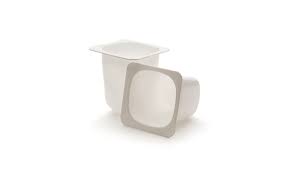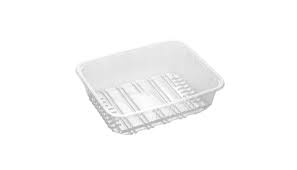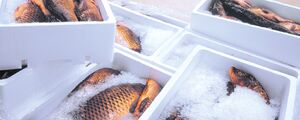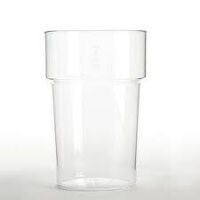PS (6): Difference between revisions
mNo edit summary |
re-structure of page |
||
| (9 intermediate revisions by the same user not shown) | |||
| Line 1: | Line 1: | ||
'''PS''' ([[wikipedia:Polystyrene |Polystyrene]]) is a type of plastic commonly used in Pots Tubs and Trays (or otherwise known as [[PTT]]) and is captured as [[Plastic|PS (6)]] in WikiWaste. Expanded Polystyrene (EPS) can be used as a packaging fill material and is captured in the same category in WikiWaste. | '''PS''' ([[wikipedia:Polystyrene |Polystyrene]]) is a type of plastic commonly used in Pots Tubs and Trays (or otherwise known as [[PTT]]) and is captured as [[Plastic|PS (6)]] in WikiWaste. Expanded Polystyrene (EPS) can be used as a packaging fill material and is captured in the same category in WikiWaste. | ||
[[File:PS 6.png| | [[File:PS 6.png|200px|left|Ps 6 symbol]] | ||
[[Category:Tonnage & Waste Types]][[Category:Acronym]] | [[Category:Tonnage & Waste Types]][[Category:Acronym]] | ||
[[PS (6)]] plastic is a naturally occuring transparent thermoplastic that is available as both a typical solid plastic as well as a rigid foam material (Expanded Polystyrene). PS plastic is commonly used in a variety of consumer product applications and in commercial packaging<ref name="CRE">[https://www.creativemechanisms.com/blog/polystyrene-ps-plastic/ Creative Mechanisms]</ref>. Dow Chemcial Company invented a proprietary process to make their trademarked and well known polystyrene foam product "styrofoam" (EPS) in 1941<ref name="CRE" />. | [[PS (6)]] plastic is a naturally occuring transparent thermoplastic that is available as both a typical solid plastic as well as a rigid foam material (Expanded Polystyrene) (EPS) and extruded polystyrene (XPS). PS plastic is commonly used in a variety of consumer product applications and in commercial packaging<ref name="CRE">[https://www.creativemechanisms.com/blog/polystyrene-ps-plastic/ Creative Mechanisms]</ref>. Dow Chemcial Company invented a proprietary process to make their trademarked and well known polystyrene foam product "styrofoam" (EPS) in 1941<ref name="CRE" />. | ||
The solid plastic form of polystyrene is commonly used in medical device applications | The solid plastic form of polystyrene is commonly used in items such as<ref name="CRE" />: | ||
*medical device applications e.g. test tubes or petri dishes | |||
* housing on smoke detectors | |||
* CDs cases | |||
* yogurt pots . | |||
The foam form of polystyrene (EPS) is most often used as a packaging material particulalry in high value items such as televisions, washing machines, dishwashers etc <ref name="CRE" /> where it has been moulded to fit the product it is protecting. Polystyrene beads are tiny bits of expanded polystyrene and are commonly found in bean bags and childrens toys such as in stuffed animals/teddy bears and as home insulation. The larger loose form of EPS (in the shape of 'figures of 8') are most commonly used to protect smaller less expansive items although their use is being phased out with more environmentally friendly alternatives (such as brown paper packaging) which can be re-used and recycled more easily. XPS is a higher density foam typically used in applications such as architectural building models<ref name="CRE" />. | |||
Foam polystyrene can be more than 95% air and is widely used to make: | |||
* home and appliance insulation | |||
* lightweight protective packaging | |||
* surfboards | |||
*foodservice and food packaging | |||
* automobile parts | |||
* roadway and roadbank stabilisation systemes and more<ref>[https://www.chemicalsafetyfacts.org/polystyrene/ chemical Safety Facts]</ref>. | |||
Polystyrene is typically (but not always) a homopolymer i.e. that it is composed only of the monomer styrene in combination with itself<ref name="CRE" />. It can be classified as either a '''thermo plastic''' material (can be heated to its melting point, cooled, and re-heated again without significant degradation) or a '''thermoset''' material (which instead of burning liquefies, allowing it to be easily injection moulded and then subsequently recycled, although thermoset plastics will not reliquify once they are "set" in solid form; they can also only be heated once, (the first heating usually during injection moulding process), this causes the thermoset materials to set resulting in a chemical change which cannot be reversed)<ref name="CRE" />. | |||
<br clear="none" /> | |||
<gallery widths=300px heights=200px perrow=4 caption="Polystyrene Examples"> | |||
File:Plastic Yoghurt Pots.jpg|thumb|Yoghurt Pots (all rights reserved) | |||
File:Plastic Trays.jpg|thumb|Plastic trays (all rights reserved) | |||
File:EPS fish boxes.jpg|thumb|EPS Fish Boxes (all rights reserved) | |||
File:PS Glass.jpg|thumb|Polystyrene Plastic Glass (all rights reserved) | |||
</gallery > | |||
====Properties==== | |||
:Clarity, electrical and thermal insulator, chemically resistant to acids and bases, waterproof | |||
====Common Applications==== | |||
:Protective packaging, food packaging (yoghurt pots, food trays), covers and fixtures, cosmetic containers, CD cases, medical applications | |||
==References== | |||
<references /> | |||
Latest revision as of 11:06, 14 July 2022
PS (Polystyrene) is a type of plastic commonly used in Pots Tubs and Trays (or otherwise known as PTT) and is captured as PS (6) in WikiWaste. Expanded Polystyrene (EPS) can be used as a packaging fill material and is captured in the same category in WikiWaste.
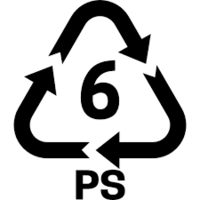
PS (6) plastic is a naturally occuring transparent thermoplastic that is available as both a typical solid plastic as well as a rigid foam material (Expanded Polystyrene) (EPS) and extruded polystyrene (XPS). PS plastic is commonly used in a variety of consumer product applications and in commercial packaging[1]. Dow Chemcial Company invented a proprietary process to make their trademarked and well known polystyrene foam product "styrofoam" (EPS) in 1941[1].
The solid plastic form of polystyrene is commonly used in items such as[1]:
- medical device applications e.g. test tubes or petri dishes
- housing on smoke detectors
- CDs cases
- yogurt pots .
The foam form of polystyrene (EPS) is most often used as a packaging material particulalry in high value items such as televisions, washing machines, dishwashers etc [1] where it has been moulded to fit the product it is protecting. Polystyrene beads are tiny bits of expanded polystyrene and are commonly found in bean bags and childrens toys such as in stuffed animals/teddy bears and as home insulation. The larger loose form of EPS (in the shape of 'figures of 8') are most commonly used to protect smaller less expansive items although their use is being phased out with more environmentally friendly alternatives (such as brown paper packaging) which can be re-used and recycled more easily. XPS is a higher density foam typically used in applications such as architectural building models[1].
Foam polystyrene can be more than 95% air and is widely used to make:
- home and appliance insulation
- lightweight protective packaging
- surfboards
- foodservice and food packaging
- automobile parts
- roadway and roadbank stabilisation systemes and more[2].
Polystyrene is typically (but not always) a homopolymer i.e. that it is composed only of the monomer styrene in combination with itself[1]. It can be classified as either a thermo plastic material (can be heated to its melting point, cooled, and re-heated again without significant degradation) or a thermoset material (which instead of burning liquefies, allowing it to be easily injection moulded and then subsequently recycled, although thermoset plastics will not reliquify once they are "set" in solid form; they can also only be heated once, (the first heating usually during injection moulding process), this causes the thermoset materials to set resulting in a chemical change which cannot be reversed)[1].
- Polystyrene Examples
-
Yoghurt Pots (all rights reserved)
-
Plastic trays (all rights reserved)
-
EPS Fish Boxes (all rights reserved)
-
Polystyrene Plastic Glass (all rights reserved)
Properties
- Clarity, electrical and thermal insulator, chemically resistant to acids and bases, waterproof
Common Applications
- Protective packaging, food packaging (yoghurt pots, food trays), covers and fixtures, cosmetic containers, CD cases, medical applications

